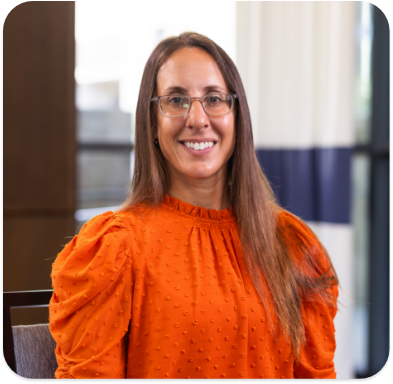A Pathway to Your Ph.D. in Functional Nutrition
The Integrative and Functional Nutrition Department at Saybrook follows a humanistic approach, examining the many factors that influence physical health, including biological, environmental, behavioral, and emotional factors, and the role nutrition plays in relation to them.
To address the need for nutrition professionals, our M.S.-to-Ph.D. Pathway in Integrative and Functional Nutrition program prepares you to become a highly competent practitioner, while saving you time and money in the process.
In this online dual-degree pathway, you will enter directly into the Ph.D. program and follow the advanced research course sequence required of doctoral students. When you have completed the 40 credits required for the master’s degree, you will be awarded your M.S. in Integrative and Functional Nutrition degree without pausing or taking time off from your Ph.D. program.
The online M.S.-to-Ph.D. Pathway in Integrative and Functional Nutrition program fulfills the current academic requirements for the Certified Nutrition Specialist (CNS) credential from the American Nutrition Association. This dual-degree nutrition program is also designed to meet the core academic requirements for the Certified Clinical Nutritionist (CCN) credential from the Clinical Nutrition Certification Board.
If you are interested in seeking the Registered Dietitian (RD) credential upon completion of the M.S.-to-Ph.D. Pathway in Integrative and Functional Nutrition program at Saybrook University, please visit the website of the Accreditation Council for Education in Nutrition and Dietetics (ACEND). ACEND® policies for Individualized Supervised Practice Pathways (ISPPs) allow individuals holding a doctoral degree without a Didactic Program in Dietetics (DPD) verification statement to apply for an ISPP; however eligibility requirements and options may vary by program. You can see which Dietetic Internships, Coordinated, or Didactic programs currently offer ISPPs by visiting Accredited Education Programs. Doctoral degree holders without a DPD verification statement must attend an ISPP that is approved to offer a track for individuals with a doctoral degree. Students interested in applying to an ISPP should research the eligibility requirements of the program where they intend to submit an application, including whether you are required to locate your own preceptors, and then contact the program director. Individuals with work experience should also inquire whether the program grants credit for specific competency requirements through an assessment of prior learning.
M.S.-to-Ph.D. Pathway in Integrative and Functional Nutrition Job Outcomes
Upon graduation, you will have the skill set to pursue rewarding career opportunities in:
- Research
- Nutrition consulting
- Product development
- Higher education
- Health program development
- Public health
Other Integrative and Functional Nutrition Programs
Interested in another Integrative and Functional Nutrition program? We offer multiple options that may align more closely with your goals.
- M.S. in Integrative and Functional Nutrition
- M.S.-to-Ph.D. Pathway in Integrative and Functional Nutrition
- M.S.-to-Ph.D. Pathway in Integrative and Functional Nutrition: Culinary Nutrition Specialization
- M.S.-to-Ph.D. Pathway in Integrative and Functional Nutrition: Integrative Wellness Coaching Specialization
- M.S.-to-Ph.D. Pathway in Integrative and Functional Nutrition: Mind-Body Medicine Specialization
- Ph.D. in Integrative and Functional Nutrition
*Credits earned depend on approved transfer credits and prerequisite courses.
Program Components
Admissions Requirements
Applicants for the M.S.-to-Ph.D. Pathway in Integrative and Functional Nutrition degree must submit the following documents:
- An official transcript from an accredited university demonstrating successful completion of a bachelor’s degree, with a 3.0 GPA or better
- Preference is given to those with a B.S. in the health, life, or physical sciences (e.g., nutrition, exercise physiology, biochemistry, chemistry)
- Professional resume or CV
- Personal statement
- Writing sample (if the department chair determines the personal statement contains grammatical mistakes, spelling errors, or poorly organized text)
Students must provide official transcripts showing completion of undergraduate science courses in the past 10 years, with a minimum grade of a B in each, including three credit units in the following: biochemistry or organic chemistry, anatomy and/or physiology, and human nutrition.
Invest in Your Future
Saybrook University remains committed to keeping higher education affordable and accessible. Our Financial Aid Department is ready to offer guidance and support in determining suitable financial assistance tailored to your needs, including potential scholarship opportunities, grants, and more.
Cost
Saybrook wants you to have the information you need to make an informed decision about your academic and career aspirations. Our cost calculator provides an estimated cost of attending Saybrook to earn your M.S.-to-Ph.D. Pathway in Integrative and Functional Nutrition degree.
Sample Courses
Research Foundations and Literacy
You will learn about the construction of scientific knowledge and how to effectively search and critically analyze published research in their field. Research ethics and ethical standards are discussed. You will examine the role of the research question as it relates to research design. This course is designed to prepare doctoral students to be successful consumers of research related to their field and to lay the foundations to support a deeper understanding about types of research and research design in future research courses.
Foundations of Integrative and Functional Nutrition
You will expand upon your knowledge of basic nutrition science and gain a foundational understanding of integrative and functional approaches to nutrition. This course reviews the fundamental principles and perspectives of conventional, traditional, integrative, and functional medical models to identify best practices for nutritional care.
Systems Biology
Key to identifying and supporting interventions that address chronic disease, this course helps you explain the physiology, pathophysiology, and applicable biochemistry that underlie the core imbalances within functional medicine. You will explore cardiovascular functions, immunity and inflammation, digestion, absorption, and elimination.
Catalog
Please refer to our academic catalog for more information on the M.S.-to-Ph.D. Pathway in Integrative and Functional Nutrition program.
Career Outcomes
Saybrook University prepares you to make an impact in a variety of high-demand careers. Below, you will find possible career options and salaries associated with an online functional nutrition degree.
Data is pulled by a third-party tool called Lightcast, which includes data from sources including the U.S. Bureau of Labor Statistics, the U.S. Census Bureau, online job postings, and other government databases. The information below represents a regional and national career outlook related to the Integrative and Functional Nutrition degree program*. Saybrook University is dedicated to assisting you in achieving your career goals.
*Many degree programs are intended to fulfill licensure requirements in specific states. The data shown here may not represent the state where you currently reside. For more information on how this program is applicable to the requirements of your state, please speak with your admissions specialist.
University Learning Experience
Our M.S. to Ph.D. Pathway in Integrative and Functional Nutrition program is a 100% online program. While the core of this program is completed asynchronously, there are required synchronous, online features designed to deepen your educational experience. We call this a Virtual Learning Experience (VLE). In addition to the VLEs, you will begin your studies with a virtual Welcome Week. Welcome Week activities, including a program orientation, are held online during the week before the start of fall and spring semesters. In-person Community Learning Experiences (CLE) are also available for you to explore. CLEs are held every odd-numbered year. They are optional and not required to complete the program.

Integrative and Functional Nutrition Faculty
Saybrook’s Integrative and Functional Nutrition faculty are practitioner-scholars dedicated to advancing their field through continued practice and comprehensive instruction. Meet some of our faculty members below.

- Associate Professor, Integrative and Functional Nutrition
- Past President, Florida Public Health Association
- Past Co-President, Broward Academy of Nutrition and Dietetics
UNBOUND: Integrative and Functional Nutrition
Guided by an interdisciplinary, integrative approach, you will examine the field of nutrition through a systems-based, humanistic lens that incorporates the environmental, social, psychological, and physiological sciences.


Understanding LGBTQ+ Food Insecurity: A Guide for Nutritionists

Integrative and Functional Nutrition’s Role in Your Health
Ready to Take the Next Step?
Submit an inquiry and one of our admissions specialists will connect with you to answer your questions and guide you through next steps.
























